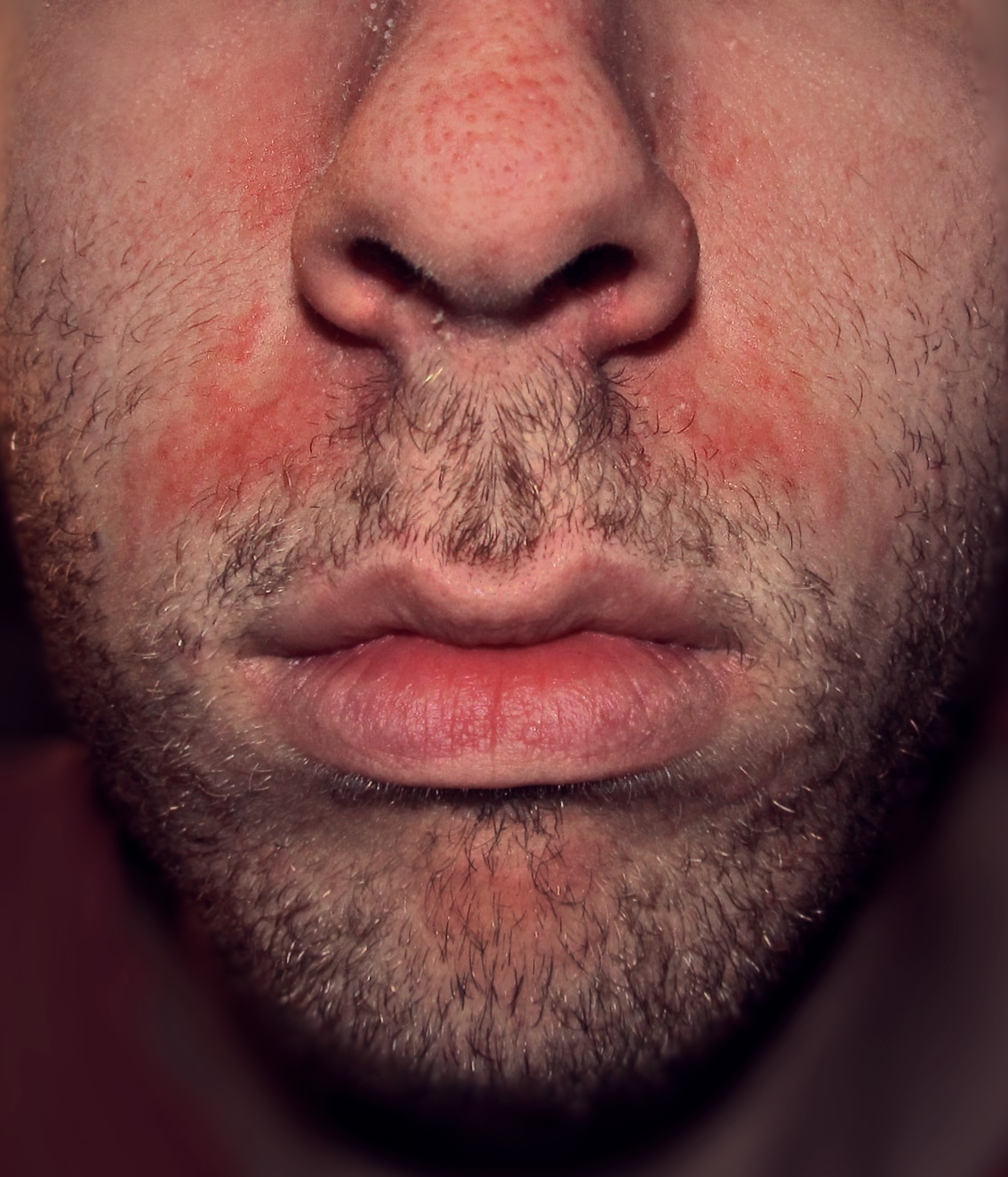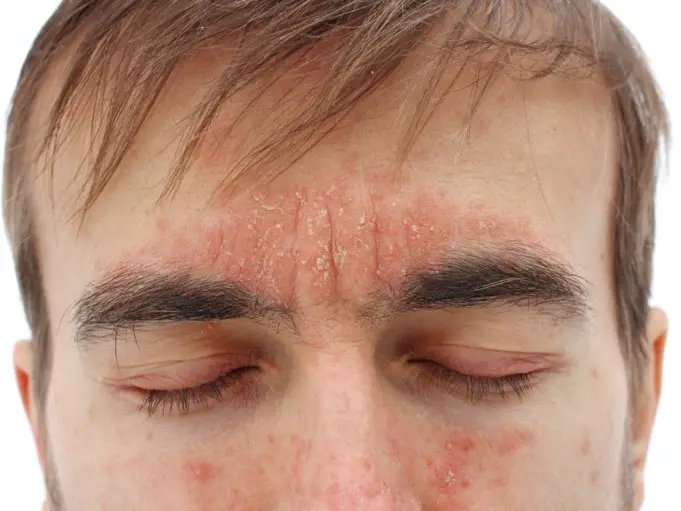Do you have an itchy skin with scaly patches that comes along with inflammation of the area? You might be suffering from Seborrheic dermatitis.
Other names for this skin condition are Seborrheic psoriasis, Seborrheic eczema, Seborrhea, cradle cap, and also dandruff. It is similar to psoriasis, an allergic reaction, or even eczema.
This is a common skin condition affecting millions of people in the world today. It is characterized by scaly patches, inflamed skin, and stubborn dandruff.
The most common place affected is your scalp but it can also affect other oily regions of your body like the sides of the nose, chest, face, eyelids, ears, and eyebrows.
Seborrheic dermatitis can go away without treatment while some people need to treat theirs before it goes away. In severe cases, it might need repeated treatment and it can return later if the root cause is not handled.
Symptoms of Seborrheic Dermatitis
Babies three months old and younger usually get cradle cap. It appears as crusty brown or yellow scales on their scalps which usually clear away before they clock a year old.
Though, most kids experience it again before they reach puberty. Some parents mistake Seborrheic dermatitis for diaper rash.
Adults also can get this skin condition on their face, most especially on their noses. It can also appear:
- On your eyebrows
- Behind your ears
- In the middle of your chest
- Below your breasts
- Around your navel
- In your groin
- In skin folds on your legs and under your arms
- And on your buttocks
Causes of Seborrheic Dermatitis
Many factors are said to cause this common skin condition. Some of them are:
- Immune system problems like irregular immune response
- A fungi infection, e.g. Malassezia (fungi) found in the oil secretion of the skin
- Stress
- Diet and lifestyle
- Weather (cold or dry weather)
- Some people think it’s about hygiene but it is far from it and neither is it caused by an allergy
Effective Home Remedies For Seborrheic Dermatitis

Boost your immune system
Seborrheic dermatitis is mostly caused by an abnormal immune response. You will experience on-and-off episodes of this if your immune system is having problems.
Avoid immune-disrupting factors like:
- The use of certain medications and chemicals
- Change your diet and eat more healthy foods to prevent systemic infections
- Reduce your use of prescription and non-prescription. Use natural alternatives which are free from side effects, medication drugs should only be used in life-threatening situations.
- Sleep well, avoid fatigue and skipping night sleep
- Your diet should be 80% whole plant foods to boost your immune system and help it work well
- Don’t allow trauma, depression, anxiety, and emotional stress have the better part of you.
Avoiding this and adopting a healthy diet will prevent this condition from getting out of hand. This can get chronic and affect your physical appearance.
This can lead to emotional distress. So the key to prevention, cure, and treatment is to boost your immune system. A strong immune system gives no room for high inflammation and hormonal imbalances which are co-causes of skin irritations.
Effective ways you can boost your immune system are:
- Engage in regular exercise to expel toxins, control stress, and improve mood
- As an adult, you need 7 to 8 hours of deep night sleep
- Take omega-3 fatty acid supplements and probiotics
- Spend time outdoors and in nature. Sunlight boosts the immune system, inhaling fresh air from trees and plants also boosts your immune system.
- Have hobbies and meaningful relationships to help you feel happy, relaxed, and more connected.
There are natural ways you can relive stress and control the levels of cortisol (the stress hormone). You can take adaptogenic herbs like ginger, meditate, pray, read, write, or volunteer in some kind of community service.
These reduce pressure and stress. You should also increase your intake of anti-inflammatory foods like garlic, fruits, coconut oil, ginger, flaxseed, avocados, bananas, and apples.
Use Natural Products
Dandruff occurs when the skin is shedding off excess amounts of dead skin cells. Though this is seen as normal, it is not entirely normal because studies have shown that dandruff is an over-accumulation of dead skin cells.
A low immune system can cause this accumulation of dead skin cells. Nutritional deficiencies, reactions to dry air, and harsh chemicals found in hair and body care products can cause this.
The fungi Malassezia lives on the scalp of most adults. When they overgrow, they can more skin cells to grow, die, and fall off, and the body might not be able to handle this.
Natural products you can use to treat this are:
- Apply a combination of coconut oil and essential oils to the affected skin part
- Browse online on how to make a 100% natural DIY shampoo or skin mask for seborrheic dermatitis. Use this to cover the affected area
- Don’t wash or shampoo too often but you have to shampoo to clear the scalp. The key is to do it in moderation. Shampooing every three days is okay if you have seborrheic dermatitis on your scalp.
- Increase your intake of anti-oxidant foods. These are mostly whole-plant foods and examples are green leafy veggies, berries, citrus fruits, and herbs.
- If the weather or your home is very dry, you can use a humidifier. The rate of dandruff is higher during winter and fall when the air is very dry.
Reduce your intake of allergen and inflammatory foods
A wrong diet is the mother of all diseases. A healthy diet will help keep inflammation at the lowest level. 80% of your diet should be whole foods. Reduce your intake of highly refined and processed foods.
They are known to aggravate autoimmune reactions and worsen the symptoms of allergies. Foods that fall in the class are:
- Added sugar and artificial sweeteners
- Sweetened beverages
- Processed and packaged foods
- Processed oils like sunflower oil, safflower, canola, soy, and corn.
- Refined grains and products made of grains.
- Conventional dairy
- Peanuts and shellfish
Hydration
Quality hydration prevents skin problems. Drink plenty of water throughout the day and avoid excess salty foods, caffeine, alcohol and sugary drinks. All these will aggravate the symptoms and dry out your skin the more.
Alternatives for these unhealthy drinks are green tea, coconut water, fruit and vegetable juices, and homemade smoothies.
Zinc supplement
Rashes and skin irritations are major signs of zinc deficiency. This is why dermatologist test for zinc levels in when treating skin problems.
Get a good zinc supplement and take. You can also apply zinc or creams containing zinc topically.
Avoid chemical products
They are irritating and cause skin problems. Applying these on your skin regularly can trigger skin problems and worsen the symptoms of dermatitis.
Over-cleaning the skin makes it worse. The best products to use are natural and organic products. Avoid commercial shampoos, they dry out the skin or harm your skin in many ways.
Avoid skin and hair care products with these ingredients:
- Parabens
- Lauryl sulfate
- Sodium Laureth
Replace these with:
- Apple cider vinegar
- Witch hazel
- Tea tree
- Aleo vera gel
- Shea butter
Avoid products that cause dermatitis and some of them are:
- Latex
- Poison ivy
- Fragrant soaps and body washes, perfumes, lotions, detergents, and shampoos.
Risk Factors for Seborrheic Dermatitis
Some things put you at high risk of developing this skin condition.
- Depression, Parkinson’s disease, and other neurologic and mental conditions
- Some medications cause these as side effects
- Having a weak or compromised immune system. For Example HIV/AIDS, cancers, patients of organ transplant, and alcoholic pancreatitis.
Sources;












